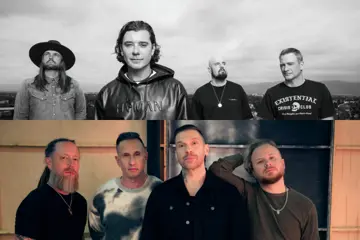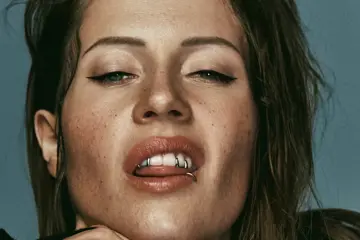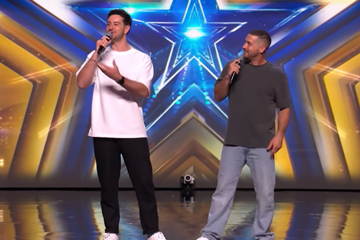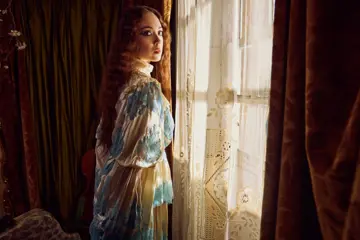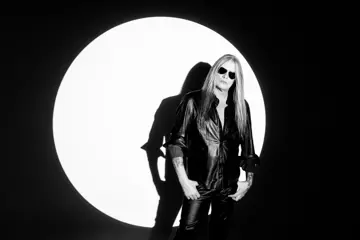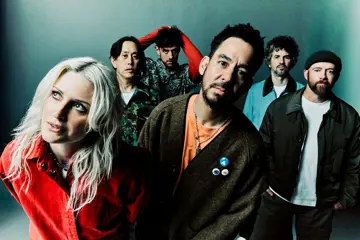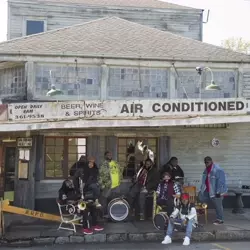 The Hot 8 Brass Band
The Hot 8 Brass BandWith sousaphones weighing in at up to 22 kilograms, we're tipping The Hot 8 Brass Band get stung by hefty excess baggage charges for international tours. Band leader/sousaphonist Bennie Pete confirms, "One or two of the gigs is specifically for that excess baggage [fee]. Yeah, it's a lot, you know? Especially with my instrument 'cause it gets charged for the overweight and the oversize, so not only is it too heavy, it's just the case and everything — the size of it is too wide, too tall." Perhaps he'd be better off buying a separate seat for it, then? "They already charge me sometimes for an extra seat," he laments. "So I need three seats.
"When we do a lot of excess travelling, it actually makes me consider about playing the clarinet or something," he laughs, before stressing, "For real! You know, racing through the airport trying not to miss the flight, trying to catch the next taxi or whatever."
Although the first instrument Pete picked up was the tuba, he confesses his "first love" was the drums. "But once I got in school, the band director wouldn't allow me to play the drums so I had to play the tuba... he said he didn't need a band full of drummers." When asked whether he looks back on this as a positive twist of fate that pushed him toward a brass instrument, Pete admits, "Yeah, definitely. And I've grown to really love it, you know? My passion for it is the same now, so now the only problem is the totin' it around."
Pete was instrumental in merging The High Steppers and The Looney Tunes brass bands, two former Fortier High School student groups, to form The Hot 8 Brass Band, who were given a boost of exposure when they were featured in two Spike Lee documentaries: When The Levees Broke: A Requiem In Four Acts (2006) and If God Is Willing And Da Creek Don't Rise (2010). The band was also featured in the third season of popular HBO series, Treme, which Pete credits for encouraging tourists to explore "the neighbourhood bars" and "the mom and pop restaurants right in the neighbourhood" rather than "just comin' to New Orleans for, you know, like, Bourbon Street and The French Quarter". "And also, at the same time, they were helping rebuild those places by just supportin' it, you know, and giving the owners and New Orleanians support and inspiration... And they had a compassion for musicians to know what we were goin' through personally, because Treme did a good job of, you know, kinda showin' that."
"When we do a lot of excess travelling, it actually makes me consider about playing the clarinet or something."
Don't miss a beat with our FREE daily newsletter
The Hot 8 Brass Band often play second line parades and we wonder whether Pete has played at the jazz funerals of people he's been close to over the years. "I had to do that a lot," he confirms, "and I had to do that early and young in my life, you know." As well as dirges, Pete says his band make sure to include "favourites from the family member, the deceased" and "any request that the family had".
On those who don't understand jazz funerals "culturally", Pete shares, "They're just like, 'Wow, they have entertainment, they have music, at the funeral?' It is a respect thing and it's also for the family, and supportin' them and lettin' 'em know that we all are here, you know? Even to the second liners."
Pete points out that jazz funerals are "broken into two parts". After the band play "slow samba music to pay their respect... the second part is [what] they call cuttin' the body loose. So that would be when the band would, you know, gather 'round the hearse and play one more dirge and play more of an up-tempo toon when the hearse would, like, leave from the procession and go on to the actual burial grounds, and leave the band there, you know, entertaining the onlookers and the friends of the family... and the family members and friends could, like, you know, think about more of the good times."
As well as celebrating the deceased's life, Pete says jazz funerals help those left behind grieve and "deal with this change that's gonna be in their life forever". Attending funerals also helps open up dialogue about death, Pete informs. "It gives you confidence to accept what's gonna happen, 'cause you know it's gonna happen... and us, as humans - we don't like to talk about things like that, you know? So it helps us deal with it and you could even begin to accept it.
"You could even critique it; you could get wit your siblings or your parents or your wife or whatever — your husband — and say, 'Look, if something was to happen to me this is what I would prefer — or this is what I want — and right then and there it's a change, because from the day you was born to that time... no one ever dwells on — they don't wanna talk about that, but it gives you that first step to say, 'Well, wow! This is gonna happen and, since it's gonna happen, I would like...' and you could just go x, y and z with it, and you could leave that in the hands of your loved ones and your family members and if they around when that happens they could do whatever they could within their power to make that happen for you. And that would help them deal with, you know, leaving you and missing you until they leave. So it's just an ongoing thing and it's kind of a therapy, you know; it's therapeutic and it helps everybody kinda cope with the reality of death.
"Think about the armed services or something like that: we go to war and we all have solemnly swore and vowed to go to war and, you know, [get] behind our country or whatever, now when we took that vow we knew — even police — we knew that we were gonna be faced with some dangerous times; we might not make it if we go to war or something like that. How could you never be talkin' to each other about that? Just goin' to war and talkin' this risk like that, you know?"



